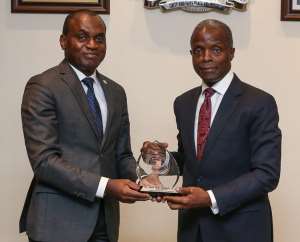
The Vice President of the Federal Republic of Nigeria Professor Yemi Osinbajo has commended the work undertaken by the African Court in dispensing justice on human rights issues in the continent.
“I commend the work of the African Court on the protection of human rights,” Prof Osinbajo stated during a call by a delegation of the Continental Court led by its President, Justice Sylvain Oré, at the State House in Abuja, Nigeria.
The Nigerian Vice President therefore pledged the commitment of Nigeria to the African Charter on Human and Peoples’ Rights and the creation of the African Court, adding that its establishment guarantees protection of human rights in Africa.
Nigeria had ratified the Protocol establishing the African Court in 2004 but is yet to make the Declaration as required under Article 34 (6) of the Protocol establishing the African Court for direct access to the court by individuals and Non-Governmental Organisations.
Prof Osinbajo assured the African Court delegation that the Nigerian government would initiate consultations amongst relevant authorities to consider making the Declaration to allow NGOs and individuals to have direct access to the African Court.
Justice Ore implored the Nigerian Vice President on the making of the Declaration, underscoring Nigeria’s influential position and its unwavering commitment to the peace and stability in the Sub-Region and in the Continent.
“For the African Court to achieve its objectives and further strengthen African human-rights systems, a greater number of countries must ratify the protocol and make the Declaration under Article 34 (6),” Justice Ore emphasised.
The African Court President thanked the Nigerian government for the warm reception accorded to the Court’s delegation.
The delegation also met with key officials of government including the Minister of Foreign Affairs, Justice Geoffrey Onyeama, and the Attorney-General and Minister of Justice, Abubakar Malami, SAN. and also conducted a sensitisation seminar for stakeholders in Abuja.
The African Court delegation also held discussions with the Executive Secretary, National Human Rights Commission and the President of the Nigerian Bar Association.
The African Court delegation also engaged the ECOWAS Court of Justice in a Judicial Dialogue as a reciprocal benchmarking visit.
The reciprocal visit follows the inaugural visit by the ECOWAS Court of Justice to the Arusha-based African Court in February last year during which a Memorandum of Understanding (MoU) was signed.
The President of the African Court said: ‘’the Judicial Dialogue with the ECOWAS Court of Justice has enhanced judicial co-operation and shared experiences between the two Courts.’’
The African Court on Human and Peoples’ Rights was established by virtue of Article 1 of the Protocol to the African Charter on Human and Peoples' Rights on the Establishment of an African Court, to complement the protective mandate of the African Commission on Human and Peoples’ Rights, with a view to enhancing the protection of human rights on the continent.
Since the adoption of the Protocol in June 1998, 30 of 55 AU Member States have ratified it and only nine State Parties to the Protocol have made the declaration under Article 34(6).
The nine are Ghana, Burkina Faso, Benin, Gambia, Cote d’Ivoire, Mali, Malawi, Tanzania and Tunisia.
The African Court is composed of Eleven Judges, nationals of Member States of the African Union elected in their individual capacity.




 Former Kotoko Player George Asare elected SRC President at PUG Law Faculty
Former Kotoko Player George Asare elected SRC President at PUG Law Faculty
 2024 elections: Consider ‘dumsor’ when casting your votes; NPP deserves less — P...
2024 elections: Consider ‘dumsor’ when casting your votes; NPP deserves less — P...
 You have no grounds to call Mahama incompetent; you’ve failed — Prof. Marfo blas...
You have no grounds to call Mahama incompetent; you’ve failed — Prof. Marfo blas...
 2024 elections: NPP creates better policies for people like us; we’ll vote for B...
2024 elections: NPP creates better policies for people like us; we’ll vote for B...
 Don’t exchange your life for wealth; a sparkle of fire can be your end — Gender ...
Don’t exchange your life for wealth; a sparkle of fire can be your end — Gender ...
 Ghana’s newly installed Poland train reportedly involved in accident while on a ...
Ghana’s newly installed Poland train reportedly involved in accident while on a ...
 Chieftaincy disputes: Government imposes 4pm to 7am curfew on Sampa township
Chieftaincy disputes: Government imposes 4pm to 7am curfew on Sampa township
 Franklin Cudjoe fumes at unaccountable wasteful executive living large at the ex...
Franklin Cudjoe fumes at unaccountable wasteful executive living large at the ex...
 I'll 'stoop too low' for votes; I'm never moved by your propaganda — Oquaye Jnr ...
I'll 'stoop too low' for votes; I'm never moved by your propaganda — Oquaye Jnr ...
 Kumasi Thermal Plant commissioning: I pray God opens the eyes of leaders who don...
Kumasi Thermal Plant commissioning: I pray God opens the eyes of leaders who don...
